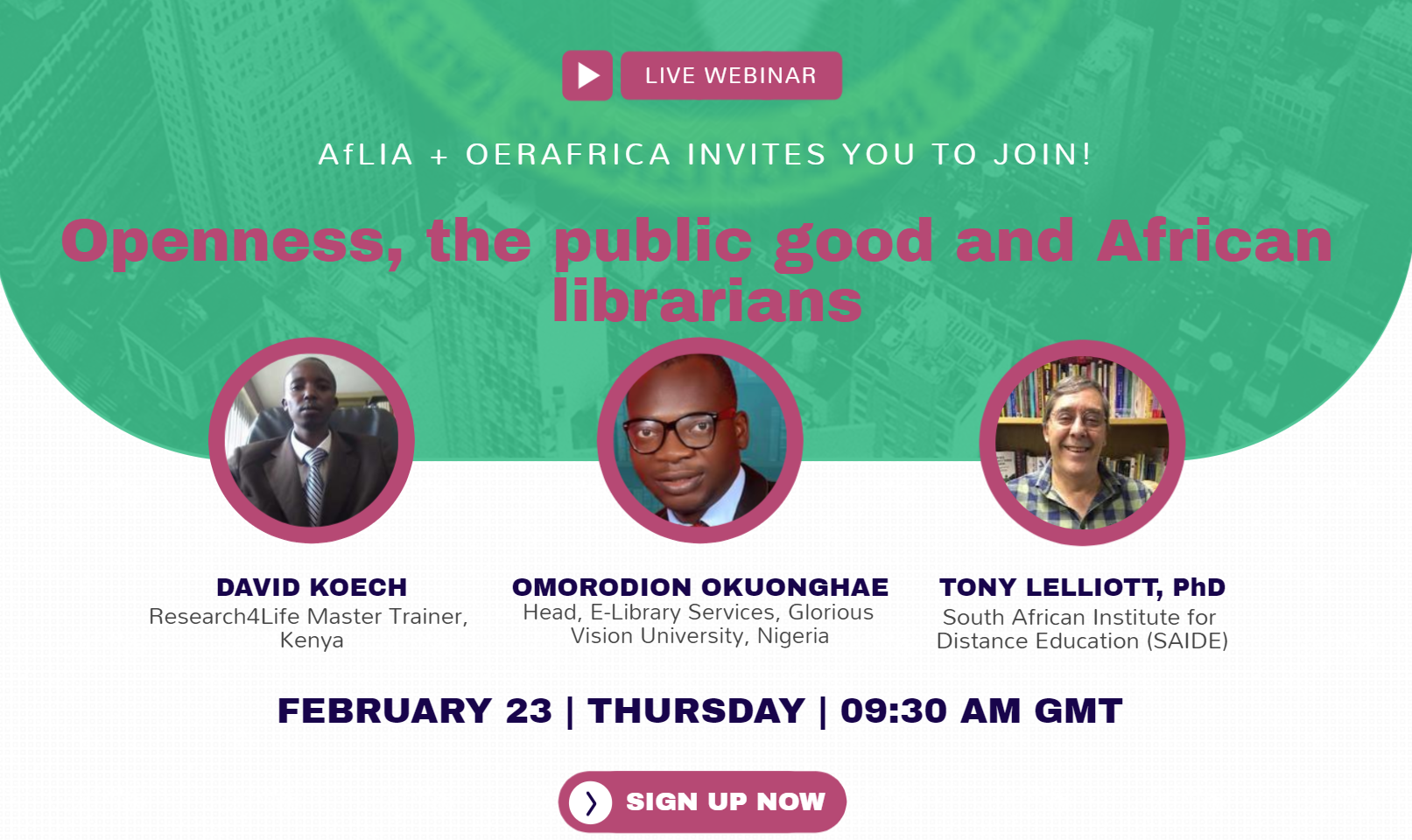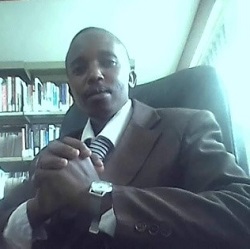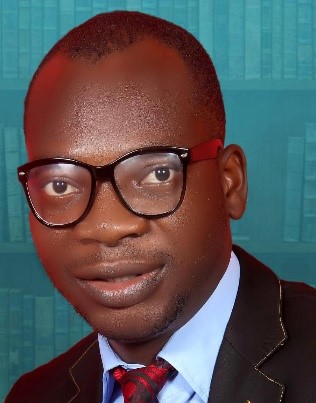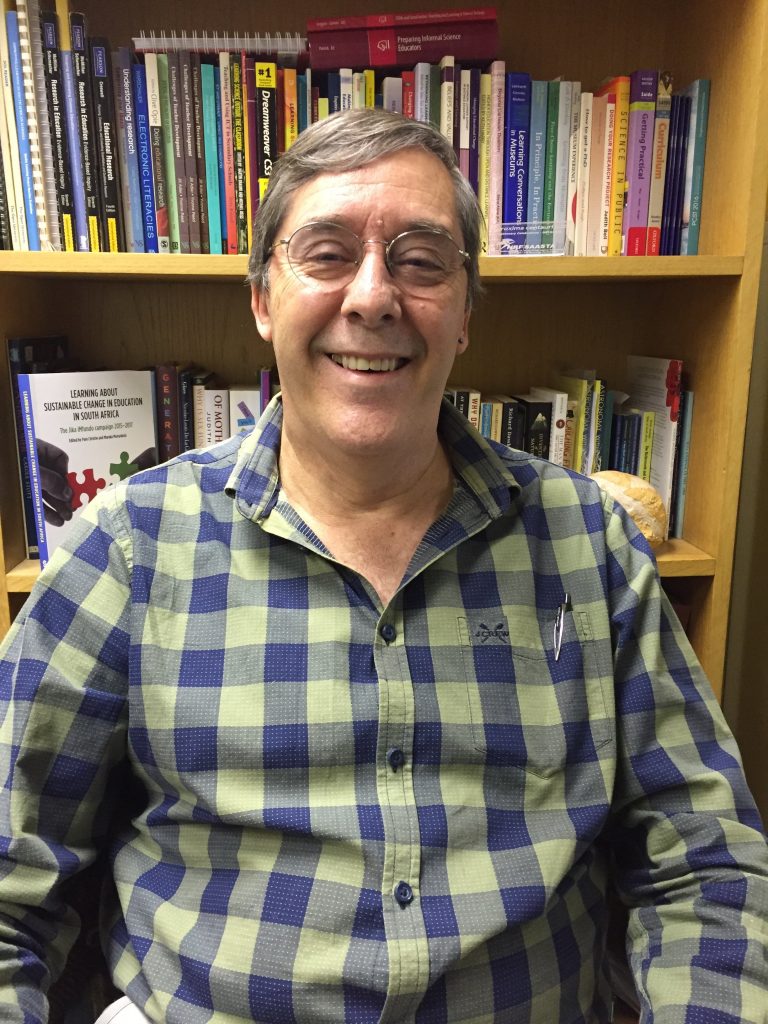Webinar: Openness, the public good and African librarians

FEBRUARY 18, 2023
AfLIA has recently signed a memorandum of understanding (MoU) with OER Africa of Saide to build a sturdy CPD framework that will project African librarians into a new era as change agents and leaders in driving open education, open access and open licensing as critical components for driving quality education and creativity in the continent.
Why open?
From the period in history when written documents became available through papyrus to the present time, libraries have been the go-to places that open up their resources for the information, learning, research and leisure-reading needs of their different user communities. The underlying purpose for the establishment of libraries of different types in the society is to provide a level playing field for the members of defined communities (schools, universities, workplaces, cities, villages etc) so that all can benefit and have access to information and knowledge that ordinarily most may not be able to purchase or access personally. Openness is heavily ingrained in the DNA of libraries and this is for the sole purpose of serving the ‘public good’ and not just for the benefit of well-placed individuals or groups.
However, the concept of openness in knowledge creation, storage, dissemination and generally in science and education has largely metamorphosed to include several intertwining strands. What are those obvious strands? How can libraries keep up with and imbibe these changes or integrate them into their processes, systems and services? How do African librarians understand the widening scope of openness? To what level have they embraced the new definitions of openness? What place does openness have in the continuing professional development of African librarians in the 21st century?
In conjunction with OER Africa, AfLIA is hosting a webinar to address all of these and more will hold on Thursday, 23rd February, 2023 by 9.30am. This webinar is the first in a series of activities that will build up understanding, adaptable knowledge and skills and adaptable. It should also interest African librarians to know that the webinar will take place during the Fair Use/Fair Dealing Week (Feb 20 -24), an embedded exception and limitation principle within copyright provisions that has been supporting ‘open’ in libraries.
Date: Thursday, 23rd February, 2023
Time: 9.30am UTC | 10.30am WAT | 11.30am CAT | 12.30pm EAT
Registration
This is a free webinar. After completing the registration form, you will receive notification via email with details of how to join the webinar.
Carefully read the section on Technical Requirements to help you prepare adequately for this webinar.
Resource persons

David Koech is a librarian from Kabarak university -Kenya, Research4life master trainer, Young African Library Leader, Founder Library Matters Initiative Africa- LMI-AFRICA blog, Sustainable Development Goals &, open educational resources (OER) advocate, Kenya sign language interpreter and basic Russian language conversant. David leads a number of impactful initiatives for his community, such as advocating for sustainable development goals to improve Libraries, health, security, peace, & education. He also uses digital storytelling to inform and to educate

Omorodion Okuonghae is the Head, E-Library Services at Glorious Vision University (formerly Samuel Adegboyega University), Nigeria and the Co-founder of the Port Harcourt Wikimedia Hub. He holds Bachelors and Masters Degrees in Library and Information Science from Delta State University, Abraka. With over 35 scholarly works to his credit, Omorodion has won numerous awards at the local, national and International levels. In May 2022, Omorodion received a full scholarship to attend the maiden Wikimedia+Libraries International Convention in Maynooth, Ireland, where he presented a paper titled Building a Sustainable Wikibrarian Community in the Global South: Library Associations as Facilitators. His keen interest in promoting open knowledge and Information Literacy skills has seen him organize and facilitate several Wikimedia trainings at the national and continental levels. Omorodion is a certified Wikimedia campaign organizer, as he had participated in the maiden Organizer Lab Course organized by the Wikimedia Foundation.

Dr. Tony Lelliott works in the area of teacher education with Saide, an NGO based in Johannesburg, South Africa. At Saide he has worked on several projects including OER Africa, the National Senior Certificate for Adults (NASCA) and African Storybook. Prior to joining Saide, Tony was an Associate Professor, an NRF C2 researcher, and worked with pre-service teachers, as well Honours, Masters and PhD students at the University of the Witwatersrand in Johannesburg. Tony is the author of 25 publications in refereed journals and books and has supervised 10 Doctoral and 13 Masters graduates to completion.
Technical requirements
Upon registration, reminders will be sent to all registrants periodically. This webinar will be hosted on Zoom Conferencing Platform. Participants, who do not have Zoom on their mobile devices and or computers, need to download, install and create an account on Zoom ahead of time (CLICK TO DOWNLOAD). Webinar attendees are encouraged to join early, preferably 15 minutes before the start of the webinar, as one may need time launch the application. The speaker will use a webcam to connect with attendees. Audio and video for the session will be streamed over computer speakers. Attendees are therefore encouraged to connect with a headset or earpiece for maximum utility. Please note that this webinar does not involve certificate of participation.
Webinar materials
A list of resources and further information will made be available at the end of the webinar, to enable thorough engagement with the webinar content. All registrants will have access to the presentation slides. The webinar recording will be uploaded on AfLIA Youtube Channel soon after the webinar to facilitate continuous engagement with the webinar content by webinar attendees and non-attendees. Webinar attendees who are fully present for webinar may be eligible for a certificate of participation from AfLIA.
Queries
For further enquiries and any assistance relating to the webinar, contact us at afliacomm@aflia.net.
